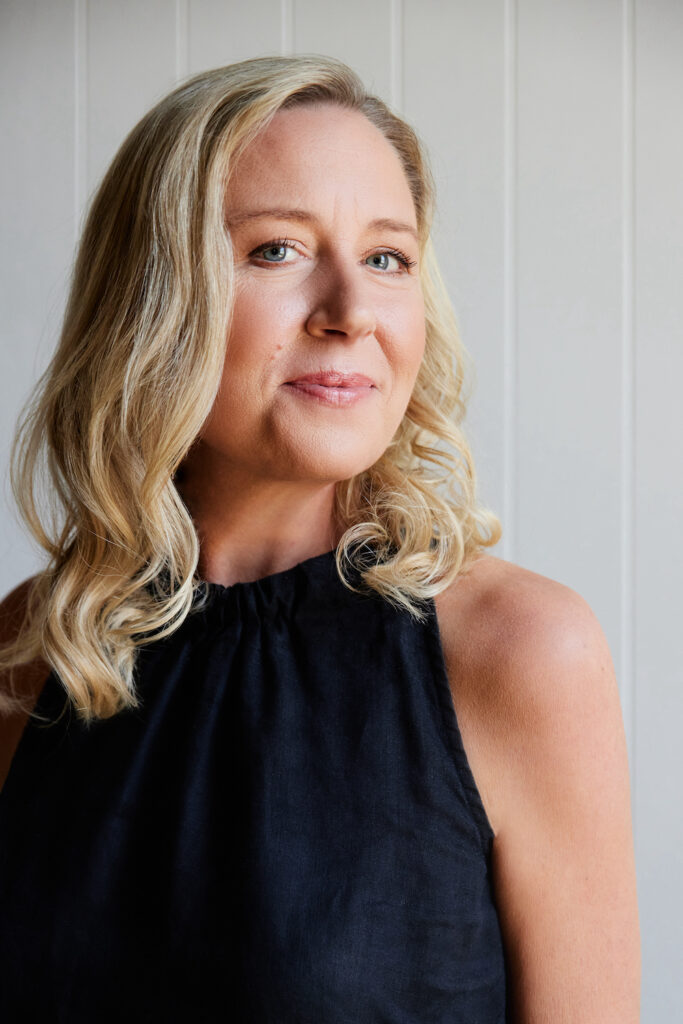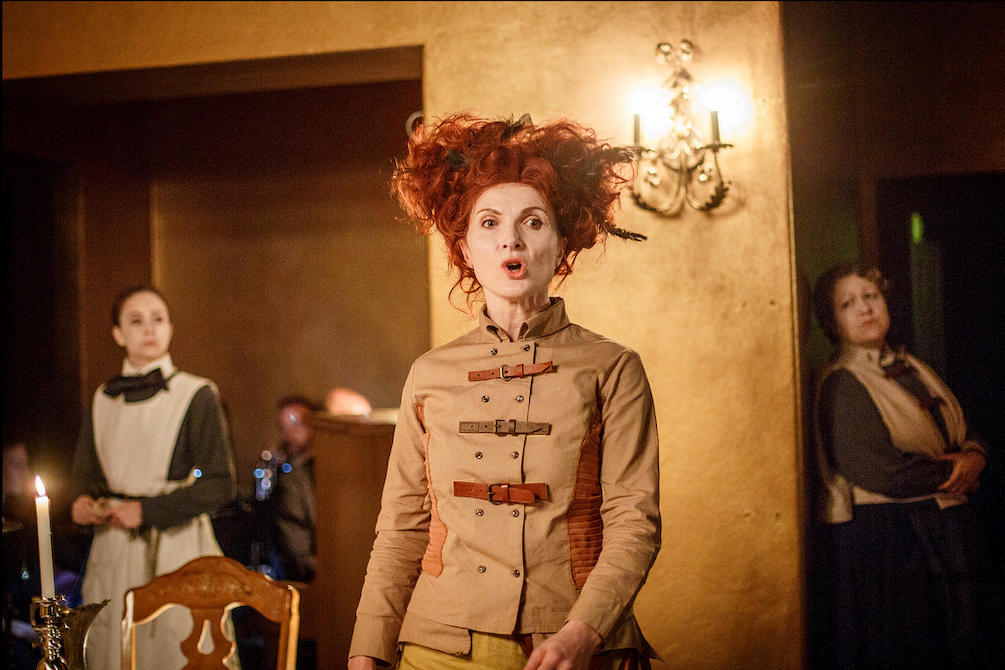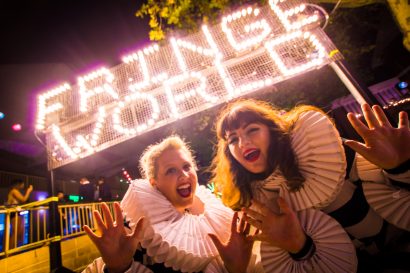A series of untimely events forced Lost and Found Opera into an extended hibernation. Three years on, the innovative company is back with renewed vigour. Co-artistic directors Mark Coughlan and Mel Cantwell give us some insight into the revival.
Duo ready to make up for Lost time
15 February 2023
- Reading time • 10 minutesMusic
More like this
- Rewriting tradition with skill and charm
- Close encounter stirs the soul
- The great unknown
When the pandemic brought the arts around the globe to a shuddering halt, Lost and Found Opera was already taking stock.
The groundbreaking arts organisation made its name producing unusual operas (the lost) in unusual spaces (the found) that enhance the work, winning fans and accolades with the concept and its execution. This included staging the world premiere of Ned Kelly in an old mill in Jarrahdale; Actéon at the UWA Sport and Aquatic Centre; Don Procopio in a suburban Italian club; and Médée in the Fremantle Arts Centre.
With 10 productions in just seven years under its belt, by late 2019 Lost and Found had become something of a victim of its own success, as several key players were snapped up for significant roles elsewhere. As the group evaluated the next step, Covid reared its ugly head. What was meant to be a short, self-imposed hibernation to reset and renew became much longer.

“The future for Lost and Found was uncertain for a time,” co-artistic director Mark Coughlan says. “Our founding team had all moved on to new, high-powered roles and the pandemic hit, which of course created huge problems for small arts companies.
“When we re-grouped to review the company and its place in the performing arts landscape, we knew there was definitely an important role for Lost and Found.”
Celebrated soprano Rachelle Durkin lent her impressive pipes to the re-launch earlier this year, where Coughlan and Mel Cantwell were announced as co-artistic directors – both of whom boast decades of experience in the arts.
Pianist and conductor Coughlan, who was Lost and Found’s founding chair, is also the founder and artistic director of the Music on the Terrace series at Government House, and a former CEO of the West Australian Symphony Orchestra, among other strings to his bow.
Cantwell is a writer, director and programmer who has served as artistic director of Perth Theatre Company and program manager for Blue Room Theatre, and has a diverse range of commissions to her name, including Mary Stuart and Whale Fall for Perth Festival.
Together with the new board, which includes Lost and Found’s co-founding artistic director Chris van Tuinen from WA Opera and arts leader Margaret Seares, they have big plans for the company’s renaissance, which will start with a production of Maurice Ravel’s rarely heard L’Heure Espagnole.
Seesaw senior editor Julie Hosking goes in search of more answers from the creative duo.

Julie Hosking: Mark, you have been involved with Lost and Found since its inception – what drew you to the company?
Coughlan: Lost and Found ticks the box for me in three important aspects of my musical life. Firstly, opera has always been a passion of mine and I’ve been privileged to see many outstanding productions in great houses around the world. Lost and Found provided an exciting opportunity to contribute to a vibrant opera scene in Western Australia and I jumped at that. Secondly, as a pianist and conductor, working with singers has always been a highpoint of my career, whether performing with top professional artists or supporting and mentoring young singers, which is something Lost and Found does very well.
Finally, I am deeply committed to building community through the arts. The challenge of Lost and Found was to expand the opera community in Western Australia, to draw new audiences to the artform and to collaborate with the wider arts community within the state. Lost and Found’s productions have always been characterised by an intense audience engagement, an element of surprise or delight and an unwavering commitment to great storytelling and artistic excellence.
JH: Mel, what sets Lost and Found apart from the other companies you have been involved in?
Cantwell: Lost and Found is built on innovation and the audience experience. Taking art out of traditional spaces and institutions is an exciting and timely way to expand the impact of performance making, and I love the company ethos, body of work and commitment to exploration and cross art-form collaboration. I am incredibly excited to be part of Lost and Found’s future ambitions, and by the possibilities of working with such an accomplished team to deliver on the organisation’s unique and inspiring mission.
JH: Why is this revival so important – what does Lost and Found bring to the WA arts landscape?
Cantwell: The company’s focus on intimacy and the joy of discovery, of discovering new spaces and rare works, makes it a completely unique and compelling offering in the landscape. Our commitment to contemporaneity, and to pushing the boundaries of the art form creates a pathway for new audiences to connect with opera, while enhancing and energising an appreciation of the form for opera-lovers. I’m a big believer that a rich array of companies and models of varying scale and purpose is essential to a thriving arts landscape. Lost and Found has been missed, and it feels very welcoming to be back.

JH: What has changed, if anything, for Lost and Found 2.0?
Cantwell: We are expanding the company’s vision to include lost texts in our programming, which is really exciting. We will continue to seek works with the scope for an operatic treatment, and to place sound and composition at the core of our creative teams, but the expanded vision means we can have a greater impact on the sector and draw from a wider repertoire of rarely performed works.
JH: How do you feel about being co-artistic directors? What strengths do you each bring to the table that perhaps the other does not have?
Cantwell: It’s hugely refreshing to share artistic leadership, to be able to bounce ideas off one another and create a vision for the company together. Mark brings a wealth of experience and skills in musical performance and working with singers, and his knowledge of both the company and the art form is an enormous asset. We have known one another for a long time, and I have enormous respect for his expertise.
Coughlan: When we were reviewing the company last year it was obvious that we needed a great theatre director to help realise our vision and to guide us in all aspects of staging, characterisation and storytelling. Mel is not only a distinguished director but has considerable experience in managing projects and organisations. Her ability to lead a performer into the heart of a work is extraordinary and I am incredibly excited to be working with her.
JH: Part of Lost and Found’s ethos is staging productions in unusual spaces. What are you looking for?
Cantwell: It’s a collaborative approach. We seek spaces that our audiences may not have previously known or entered, spaces that are surprising and allow us to take these stories out into the wider world. The audience journey to the space is also important to us, and we are interested in locations that can be transformed into the world of the work we are presenting.
JH: Can audiences expect a mixture of established artists and emerging opera singers?
Cantwell: Yes, absolutely. Mark and I are both committed to nurturing emerging talent and creating opportunities within our productions for skill-building and exchange. We are both inspired by the impressive pool of up-and-coming artists and a mix of experience always creates immediacy and surprise in process and production.
Coughlan: Bringing early career performers together with experienced practitioners can also be very powerful in creating a nurturing and supportive environment.

JH: Tell us about Maurice Ravel’s L’Heure Espagnole. Why did you choose this particular opera as your return production?
Coughlan: When Lost and Found looks for works to present there are several aspects to consider. In the case of L’Heure Espagnole, we started with the fact that Ravel wrote some of the most beautiful music of the 20th century. His music is sensuous and evocative and full of ravishing textures and colours and he writes extremely well for the voice. Equally important is the fact that this story revolves around a clockmaker and his wife and was originally set in a clock shop. This creates exciting potential for staging the work. Also, the clockmaker’s wife is a fascinating character, a powerful woman who easily manipulates the men who surround her. So the work has rich potential for us to explore. The hunt for a great venue is on and we are hoping to present the production around the middle of the year!
JH: Do you feel the appetite for, and appreciation of, the arts changed during Covid?
Cantwell: It feels like we are on the cusp of exciting change and growth across the sector in WA. There was a galvanising aspect to the Covid years for local artists – an opportunity to look inward, to appreciate the breadth of talent and artistic endeavour in the state. It feels like this period of creative resilience will have a long-lasting impact on our work, confidence, and collective aspirations for the sector.
JH: What excites you about the future?
Cantwell: The opportunity to uncover little-known or rarely performed works, to unearth stories from the past and find their contemporary resonance. Building artistic teams across the spectrum of musicians, singers, actors and designers to create unique audience encounters with the operatic artform and the city itself.
Stay tuned for details on Lost and Found Opera’s first production
Pictured top: Mel Cantwell and Mark Coughlan are looking forward to growing Lost and Found Opera. Photo: Jessica Wyld
Like what you're reading? Support Seesaw.






